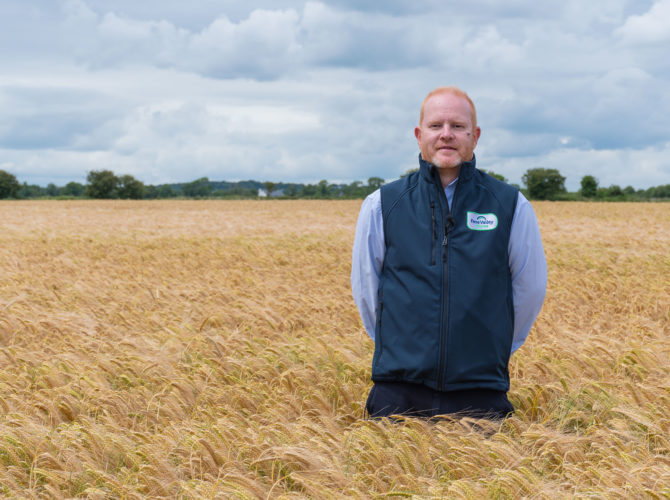Variety Selection is Fundamental to Reducing Risk in Cereal Production
13th September 2023

The 2023 growing season and harvest has proved the point that no two seasons are ever the same. While the unpredictability of the weather is outside of our control, Stephen Bell, Technical Support Manager, explained that we can help you reduce risk by selecting resilient cereal varieties that give consistent reliable performance that you can depend upon. We have carefully selected winter cereal varieties specifically suited to local conditions paying particular attention to disease resistance, straw strength, and grain quality.
The 2-row winter barley varieties KWS Tardis, Bolton and Bordeaux continue to deliver on yield, grain quality and stem stiffness combined with very strong disease profiles and retain their position among the top performing varieties on the Recommended List. SY Kingsbarn is a low risk 6-row hybrid barley with good yield potential, strong disease resistance package and critically very good resistance to lodging and brackling, two key attributes to look out for in 6-row barley varieties where the straw needs to be strong enough to carry the weight of a 6-row head.
All our high performing wheat varieties have been selected for strong resistance to septoria, with good treated and high untreated yields, good straw strength and specific weights. KWS Extase and Graham continue to lead the pack in terms of yield, quality, and robust agronomic properties. Spearhead, the highest yielding wheat on the Irish RL, continues to perform well combining very high yield potential at an early harvest.
Mayflower is an extremely robust variety with best resistance to all the main wheat diseases including eyespot, a weakness of many other varieties. With its strong resistance to septoria and eyespot Mayflower is well suited to early drilling and fits well into the second wheat slot in the rotation. Theodore also provides great reliability in terms of disease resistance and has proven itself over several seasons as a dependable variety best suited for the wholecrop market.
Mascani and Husky remain the winter oat varieties of choice for milling, renowned for producing good yields of quality grain with high kernel content and low screenings. Mascani also has one of the best combinations of yield and disease resistance with above average scores for lodging resistance.
The popularity of hybrid rye continues locally and when grown as whole crop provides an excellent second forage to supplement grass silage diets. This season the varieties KWS Tayo, Helltop and KWS Serafino are available and are well suited for wholecrop silage for livestock or as a feed stock for anaerobic digesters. Hybrid rye is best sown from mid-September through to mid-October and is a relatively low input crop in comparison to other cereals. Seed of KWS Fido winter triticale is also available and like rye offers an alternative cereal option for wholecrop.
While variety selection is the first line of defence against disease, seed treatments are the starting point of the disease control programme in cereals. Seed treatments are the only way of reducing seed borne diseases like smut and seedling rots which are covered by single purpose dressings (SPD) and for soil borne diseases such as take-all which can be reduced by Latitude seed dressing.
More technical seed treatments such as Vibrance Duo and Kick off can be applied to seed which also improve crop vigour and resilience offering added protection through the winter, especially in cold wet seed beds. Manganese, applied as a seed treatment is particularly beneficial to the establishment of the crop where cereals follow grassland are a second or third cereal, in high pH soils, soils, which have recently been limed, high P low K soils, where there is poor drainage or in puffy unconsolidated seed beds.
For further information and advice on rotation planning and variety selection for your farm please contact your local Fane Valley Agronomist or call the Agronomy and Forage team on 028 9261 0485.

